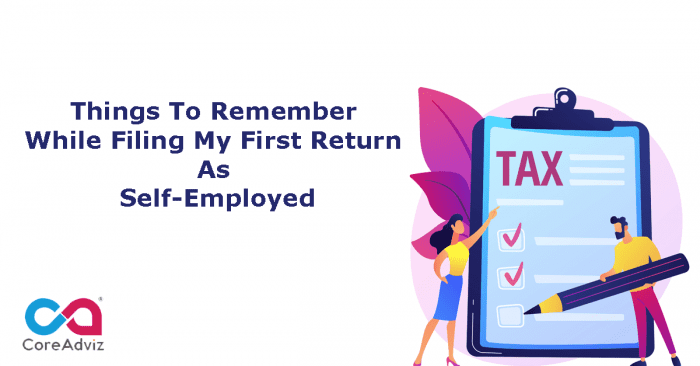Things To Remember While Filing My First Return As Self-Employed

- 12/07/2021
- Self Employed
With new avenues of businesses opening up in the UK, there are several people who are now shifting from service to self-employment. Also, there are budding entrepreneurs who have found self-employment through their passion and hard work. Today I will be focusing on the areas that you need to take care of when you are filing your returns for the first time as a self-employed.
Understanding the concept
As self-employed, the responsibility of paying taxes to the Government is yours. Unlike under salaried structure, where organization deduct payable taxes and national insurance from your monthly stipendor salary, here you will have to take the initiative by self.
What taxes do I need to pay?
As a self-employed person, you are required to focus on three different areas:
- Income Tax
- National Insurance Contributions via Class 2 Form – fixed small contributions on weekly basis
- National Insurance contributions via Class 4 Form – charged on the basis of business profits at the end of every year.
When is my tax due?
For a self-employed person, the due date for tax submission is 31st January of every year. HMRC may ask you to pay the following year’s tax on estimated value as well – once on 31st January and remaining on 31st July. This means for the first year you may have to pay 150% of your tax bill and the remaining 50% to be paid in July of the following year.
Do I need to calculate taxable income every month from my total income?
As an accountant for self-employed, I would always recommend you to do this book-keeping of recording of operating and admin expenses periodically to reduce all your effort at year end. This way you can figure out what is taxable income after reducing your total gross receipts minus total expenses.However, if due to unavoidable circumstances you are unable to do so, then you will have to do year-end, otherwise you will end-upbe paying the respective tax amount from the total gross receipts (invoices) earned during the tax year.
Suppose I miss my tax deadline?
You certainly do not want to be in a situation where you have missed your tax deadline. If something like this happens, then you will have to pay penalty charges in addition to your taxes. For start-ups who have failed to register their entity with HMRC, you may have to pay 100% penalty to your total payable tax.
Where do I register myself?
You can register yourself with the HMRC by visiting here.In the portal, you would be required to sign in using your Government ID & Password. In case you have not created an account, then you can click on “Create Sign in Details” and then share your official email address to proceed.
For any assistance on the registration or login process, you can connect with HMRC at 0300 200 3500.
What things do I need to take care of while filing taxes?
As a self-employed, you will be required to maintain the following:
- Receipts for all expenses connected to your business/ self-employment
- Sale invoices
- Track of cash flow (in and out)
- Statement of accounts
- Bank Statements
- Credit notes/ Debit Notes, etc.
Majority of these tasks require professional accounting skills. An accountant for self-employed would be the right person to assist and guide in this regard. Additionally, services like tax planning, and investment goals also become readily accessible.
In case you have questions regarding self-employment taxation or need guidance, do feel to connect with me at +44 3301331114